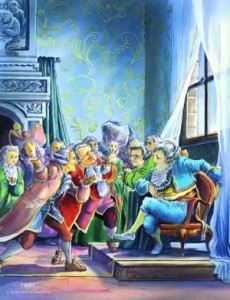 The Emperor’s New Clothes by Hans Christian Anderson is about an emperor who hires two swindlers to create a new suit. The emperor presides over a kingdom of prosperity and peace and is pretty concerned about appearances. The swindlers manage to sell him a new suit of invisible material that they claim is visible only to those worthy to lay eyes upon him. Once it is “finished” they drape him in pantomime and he proceeds to swagger naked amongst his minions only to called out by a child who says “the emperor has no clothes!” The moral of the story is that none of his loyal inner circle bothered to tell him he was naked. It had to be a kid on the street who didn’t have anything to lose to point out his folly.
The Emperor’s New Clothes by Hans Christian Anderson is about an emperor who hires two swindlers to create a new suit. The emperor presides over a kingdom of prosperity and peace and is pretty concerned about appearances. The swindlers manage to sell him a new suit of invisible material that they claim is visible only to those worthy to lay eyes upon him. Once it is “finished” they drape him in pantomime and he proceeds to swagger naked amongst his minions only to called out by a child who says “the emperor has no clothes!” The moral of the story is that none of his loyal inner circle bothered to tell him he was naked. It had to be a kid on the street who didn’t have anything to lose to point out his folly.
In today’s age, the fable is a metaphor for those in HR who are unwilling to state an obvious truth to a higher up out of fear of appearing stupid, sacrilegious, or politically “incorrect.” They would sooner let a company’s reputation stick out buck naked than tell the truth about the company culture and reputation. This is co-dependency with a superior who wants Yes-men, not accountable partners.
I arrived at this observation because I am always struck by the stark difference between what companies think their employees think about them and what they tell me when I interview them. I also am always shocked about what those employees will say on Twitter, Vault, and any other number of “pink slip” sites about these top-rated employers. I wonder if anyone in competitive intelligence, PR, marketing, or HR ever reads about the fallout of bad managers making bad decisions, including furloughs, reduced hours, wearing double hats, etc. When did having a bad reputation not count?
I’ll give you an example of something that happened to me at Wal-Mart. I haven’t recruited for Wal-Mart. Last week I watched a show on the Discovery Channel about Wal-Mart’s Super Store operations. They have onboarding sessions and songs that everyone sings that promote team spirit at Wal-Mart. They showed the droves of people who drove for miles to work there. Right after I watched the show, my iPod had to be replaced. Since I was too lazy to go to the Apple store, and I wanted it right now, I went to Wal-Mart. While I was standing at the counter trying to get this chick to hand me the iPod, she turns her back to me and starts complaining about her hours being reduced to another guy who is complaining about his benefits. I finally interrupted them and asked her to please hand me the iPod and take my money. I got home, got down to my iTunes work, and opened up my gmail account, and there was an email about boycotting Wal-Mart on account of some hideous thing that it did to bust a union. In the course of one week, I had some serious employment brand material in my consciousness.
What is interesting about the TV show, the store experience, the e-mail, and the press about Wal-Mart is that there is a level of chatter about its brand that is beyond their control. Wal-Mart feels it is well on the way to rehabilitating its image through a new logo and green Super Stores; yet, that doesn’t match my personal experience in that week. What can it do about Twitter, e-mail chains, at the store, in the news, and across the Thanksgiving dinner table, especially if one incident adds fuel to the fire?
I chose Wal-Mart because well, that happened to me last week, and that is a fairly large target. I won’t be the first one to raise this reputation issue about them. Frankly, it probably doesn’t matter what people think about its “employee” brand because they employ groups of people who have limited choices and who presumably grow in faster and larger numbers than let’s say, semiconductor design engineers with PhDs. What is interesting is when all of those things collide and affect more vulnerable brands.
The war for top talent is going to get fought and influenced by Twitter, Vault, users groups, and former employees. And in a country like the U.S. where services and design are the only real place where job growth is, people know each other. Maybe some companies should consider cutting down spend on money for logos and Superbowl ads, and treat people better.